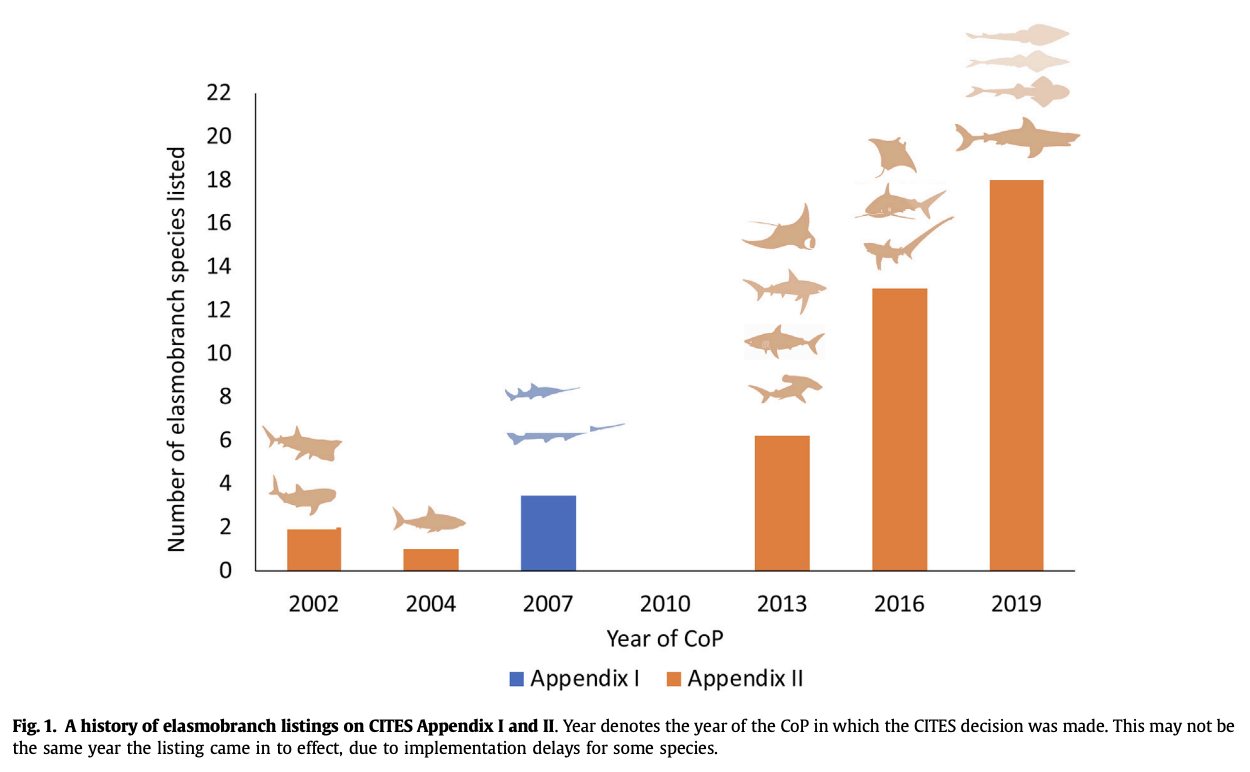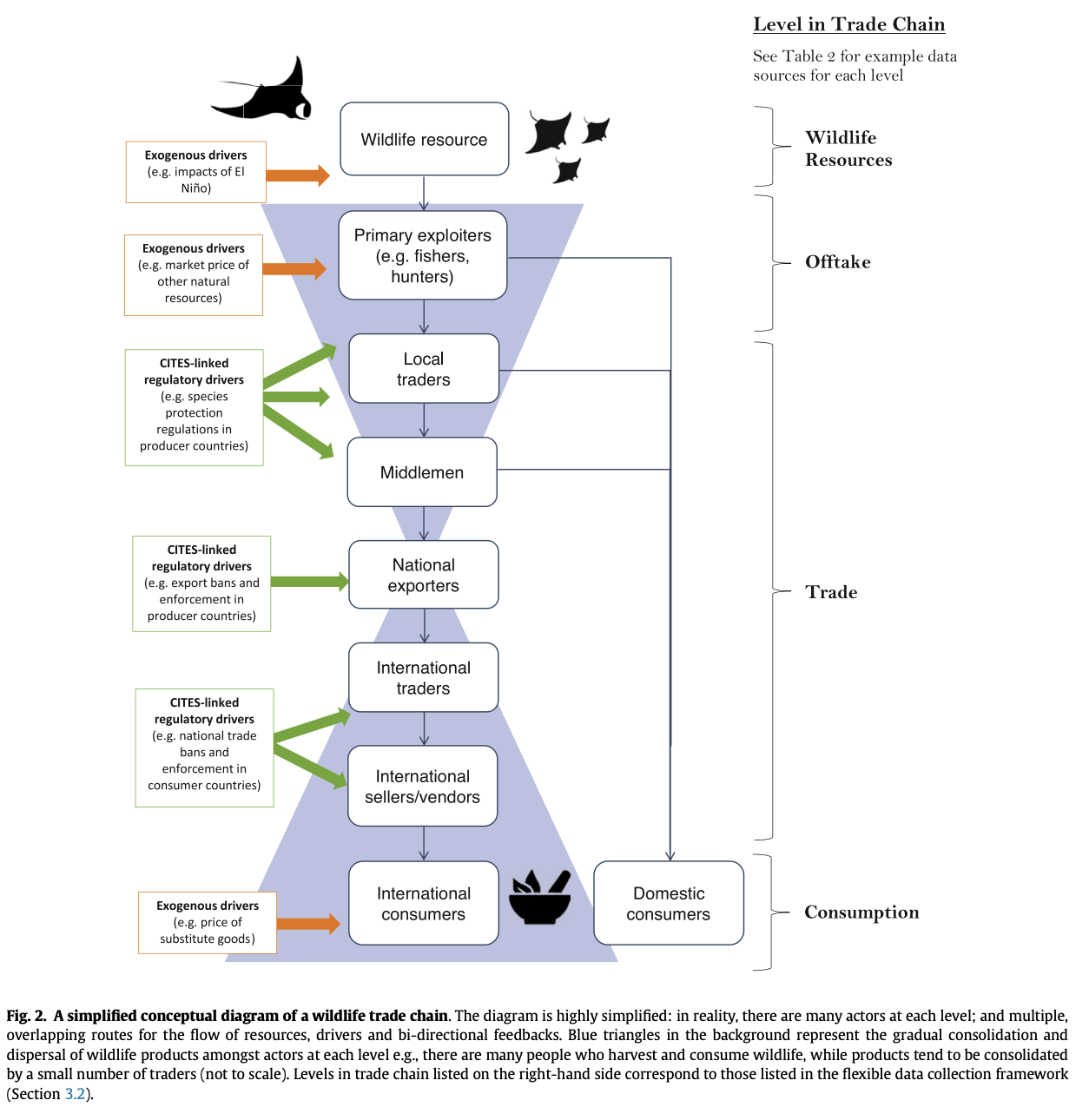Assessing the impact of regulations on the use and trade of wildlife: An operational framework, with a case study on manta rays
June 2020
Hollie Booth, Simon Pooley, Tom Clements, Mochamad Iqbal Herwata Putra, W. Peni Lestari, Sarah Lewis, Luke Warwick & E.J. Milner-Gullanda
Keywords: Elasmobranchs • Impact Evaluation • Law Enforcement • Wildlife Trade • Compliance • CITES


Summary: Overexploitation poses a significant threat to wildlife, especially economically valuable species. Governments use multi-lateral environmental agreements like CITES to regulate species utilisation and trade. However, it is unclear how effective these regulations are in achieving conservation goals. The lack of data, bias, complexity, and uncertainty hinder impact assessments. A practical approach combining data analysis and causal inference can overcome these challenges. Using manta ray trade in Indonesia as a case study, the study examines the impact of regulatory reform on mortality rates. The findings highlight challenges, opportunities, and recommendations for assessing wildlife trade regulations.
Abstract
“Overexploitation represents a significant threat to wildlife, with the severest impacts felt by slow growing, economically valuable species. Governments often seek to address this through regulating utilisation and trade of species, which is commonly catalysed by multi-lateral environmental agreements (MEAs) such as the Convention on the International Trade of Endangered Species (CITES). However, it is often unclear to what degree CITES and associated regulations lead to tangible conservation outcomes. Robust impact assessments are needed to understand whether regulations are effective for achieving biodiversity conservation goals, and to learn lessons for future policy interventions. Yet such assessments are hindered by data paucity, bias, complexity and uncertainty. Here we discuss key challenges for assessing the impact of regulations on the use and trade of wildlife, and offer a practical approach to overcome them. Our approach combines an integrated framework for collating and analysing disparate and methodologically inconsistent data with a robust process to establish causal inference (and hence assess impact). This framework and process can be applied to any regulation, species or country context. To demonstrate its utility we apply this approach to the case of manta ray utilisation and trade (Mobula alfredi and M. Birostris) in Indonesia. This case study is particularly important due to the recent increase in the number of commercially important elasmobranchs listed in CITES appendices, with Parties adopting various national-level regulations to implement their CITES commitments. However, it is unclear to what degree these listings lead to meaningful regulatory reform, and much-needed reductions in fishing mortality, utilisation and onward trade. Indonesia is also a priority country for effective regulatory reform, due to its role as a major source country for international elasmobranch trade. Overall, we highlight challenges and opportunities for assessing the impact of wildlife trade regulations, which are generalisable across species and contexts, and provide the first attempt to assess the impact of such regulatory change on manta ray mortality in a source country. We also offer recommendation for future implementation and evaluation, emphasising the importance of mixed-methods, multiple datasets, and explicit acknowledgement of bias and complexity.”
Author Affiliation
The Interdisciplinary Centre for Conservation Science, Department of Zoology, University of Oxford
The Wildlife Conservation Society
Department of Life Science, Silwood Park Campus, Imperial College London
Department of Geography, Birkbeck University of London
Department Of School of Life Sciences, University of KwaZulu-Natal
Marine Megafauna Research Group, Misool Foundation, Savu Sea Program
The Wildlife Conservation Society Indonesia Program
The Manta Trust
Funded by
Wildlife Conservation Society
UK Government Darwin Initiative
Vulcan Philanthropy
